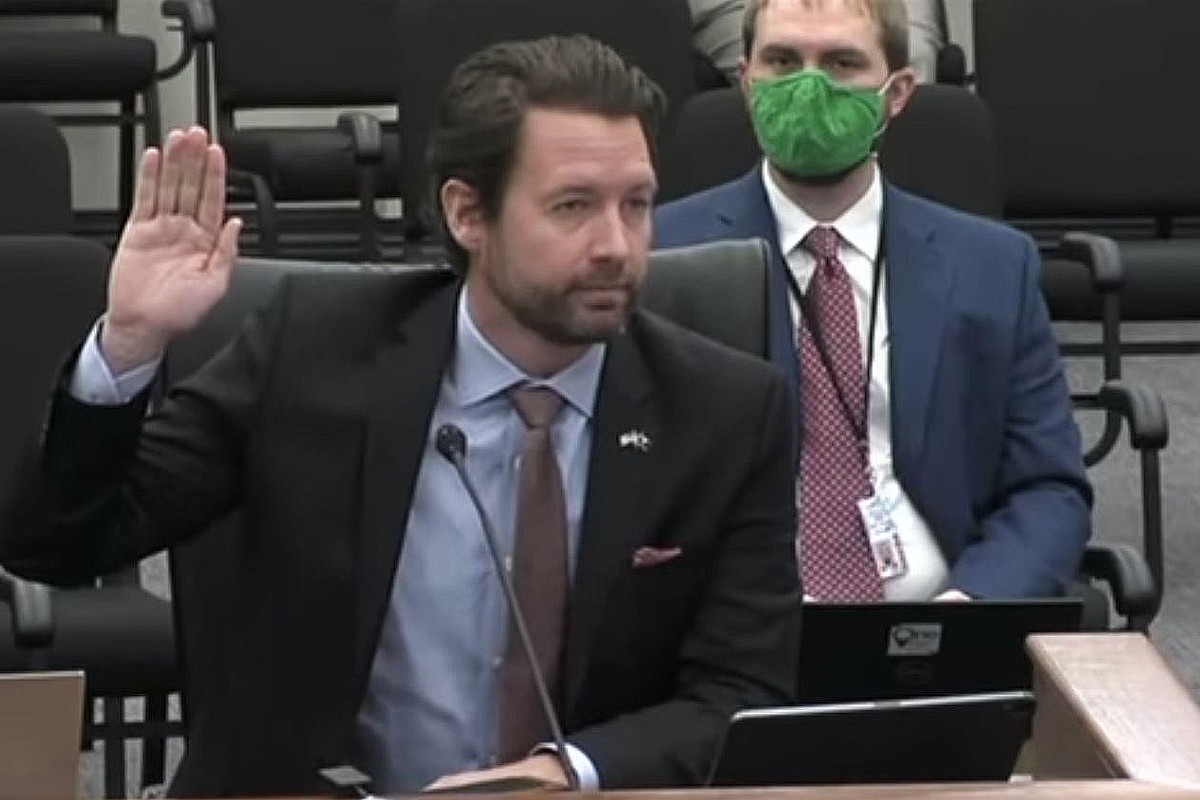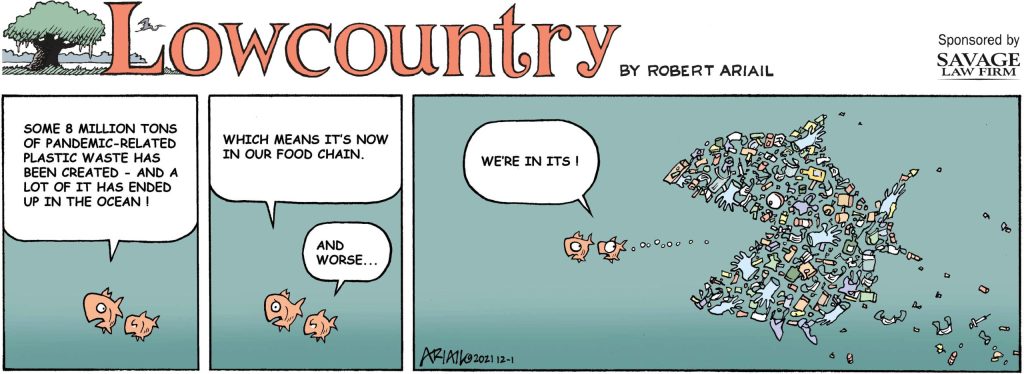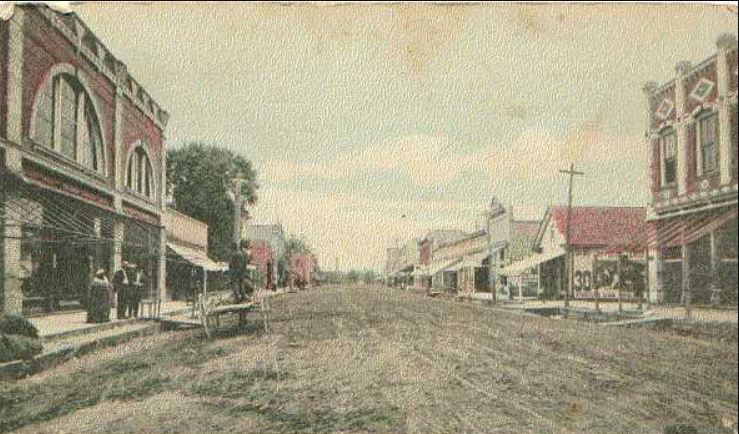STATEHOUSE REPORT | ISSUE 20.49 | DEC. 3, 2021
BIG STORY: 5 things we learned about S.C.’s redistricting
NEWS BRIEFS: State may turn down federal pre-K funds, report says
LOWCOUNTRY, Ariail: Plastic waste
COMMENTARY, Brack: Unite to protect America’s democracy
SPOTLIGHT: S.C. Clips
FEEDBACK: Send us your thoughts
MYSTERY PHOTO: Old street
5 things we learned about S.C.’s redistricting

By Andy Brack, a news analysis | As state legislators pushed forward this week on approving new election districts for state House, Senate and congressional seats, new information about the backroom process came to light.
 Every 10 years after a new census, the U.S. Constitution requires reapportionment of election districts — redrawing of the maps to make them fair based on population shifts. But across the country, the people who reconfigure the maps — incumbents and their staffs — are notorious for drawing them in their favor and trying to squeeze out members of the minority party.
Every 10 years after a new census, the U.S. Constitution requires reapportionment of election districts — redrawing of the maps to make them fair based on population shifts. But across the country, the people who reconfigure the maps — incumbents and their staffs — are notorious for drawing them in their favor and trying to squeeze out members of the minority party.
It was no different this year in South Carolina, despite meetings across the state in which state House and Senate members separately listened to the public. In the end, the state Senate offered a new Senate map that roundly was viewed as relatively fair based on demographics and the partisan make-up of the electorate.
But the state House offered a map that was roundly criticized for extending a partisan advantage of Republicans and forcing some Democratic and rural incumbents into battles against each other. The Senate also offered a proposed congressional map that also has been criticized for ignoring partisan changes in the Lowcountry.
The state Senate held a Monday hearing on the proposed congressional map (the House hasn’t yet offered one). On Thursday, House members voted overwhelmingly to approve its map. Both will be in session Monday to continue work on redistricting. Based on this week’s efforts, here’s a rundown of what we learned:
- Not competitive. The new maps generally aren’t competitive, meaning that it’s predictable who or what party will win before any election is held. “Safe” districts are mostly drawn for Republicans or Democrats, even in areas that could have districts configured so that a Republican, Democrat or third-party candidate could win.
The best congressional example is the proposed First District on the coast where a Democrat, Joe Cunningham, won in 2018, but lost in 2020 to now-U.S. Rep. Nancy Mace, a Republican. The proposed district splits Charleston County and makes it a more Republican district, effectively insulating Mace from a Democratic challenge.
“The maps are awful,” Cunningham told the Senate redistricting committee this week. “They make no sense, unless, of course, the sole purpose of these maps is to make it harder for a Republican to lose.” [See video.]
Later, Cunningham, who is running for governor, questioned why senators were afraid of competition, poignantly adding, “If gerrymandering was art, this plan would be a Picasso. Rip up this map. This map isn’t even worth the paper it’s printed on.”
2. Little elected input. When one senator asked how many congressmen offered input into the congressional map, a state Senate staffer said only U.S. Reps. Joe Wilson, a Republican, and Jim Clyburn, a Democrat, gave information before it was drafted. S.C. Sen. Margie Bright Matthews, D-Colleton, complained she wasn’t consulted about the congressional map. According to The State, “No members of the S.C. Senate redistricting committee were apparently consulted” either.
Interestingly, an outside “independent Republican group” did give input, according to published reports. “The folks in Washington, D.C., drawing these maps don’t like competition,” Cunningham said. “They don’t want close elections. They want safe elections.”
3. Harms turnout. Cunningham pointed to how the new maps denigrate democracy, instead of promoting it. In testimony, he said he understood why people thought it wasn’t worth voting these days because the results seemed largely predetermined due to the way the maps are drawn. “They have a damn good point,” he said, according to reporting by The State.
4. Racial bias. The congressional map, in particular, was criticized for how it used race as a factor. According to The Post and Courier, “District 1 would represent the fewest Black residents of South Carolina’s seven seats, at 68 percent white and 17 percent Black, while the population of [Clyburn’s neighboring] District 6 would fall to just below 50 percent Black.”
5. Meaningless “transparency.” While state House and Senate members traveled the state to get public input for mapmaking, Lynn Teague of the League of Women Voters of South Carolina wondered whether the House’s outreach effort was just for show.
“They traveled through the state, but if they actually listened to anything said, it wasn’t evident in the resulting map,” she told Statehouse Report. “No one asked to have their communities like James Island hacked into pieces. No one asked to have all possible districts rendered noncompetitive. … No one in the House actually made any significant effort to respond to any critique of their maps.”
The House and Senate return Monday to continue consideration of new maps.
- Have a comment? Send to: feedback@statehousereport.com.
State may turn down federal pre-K funds, report says

Staff reports | Republican leaders in South Carolina are reportedly among a group of national conservatives who could question or turn down federal funding to expand universal pre-kindergarten, according to a report Wednesday in The Washington Post.
A plan recently OK’d by the U.S. House of Representatives and awaiting approval by the Senate would send $110 billion to states over six years to offer free pre-kindergarten for 3- and 4-year-olds nationwide.
And while similar proposals have garnered support from both Republicans and Democrats in the past, some GOP lawmakers across the country are reportedly ready to say, “No, thanks,” if the funding comes from the Biden-backed bill.
“Republican lawmakers in Missouri, New Hampshire, North Carolina, South Carolina and Minnesota told The Post that they will reject or are troubled by aspects of Biden’s proposed pre-K expansion,” the D.C. paper reported.
Though the proposal would send federal dollars to pay for some of the costs, legislatures would have to appropriate funds to cover the rest.

State Rep. Rita Allison, R-Lyman, told the Charleston City Paper on Thursday there hasn’t been much talk of the federal dollars for pre-K in the Palmetto State yet, but that leaders would have to see how the proposal impacts the bottom line, if passed.
“That’s the thing about the federal money coming in: It’s good for a one-time push,” she said. “But when you start looking at something that is recurring, that means that the state has to be in a position to pick it up when the time happens.”
- Read the full story by City Paper editor Sam Spence.
In other recent news:
![]() S.C. has 1,000+ vacant public school teaching positions. A new survey reveals an 88 percent increase in the number of vacant teaching positions across South Carolina. That’s more than 1,000 teacher vacancies that are impacting up to 20,000 students, one organization said. The survey also showed 6,900 educators from last year didn’t return to jobs in their districts, with 18 percent retiring, 34 percent leaving for “external reasons” and 27 percent for “personal reasons.” More: The Post and Courier | WIS TV.
S.C. has 1,000+ vacant public school teaching positions. A new survey reveals an 88 percent increase in the number of vacant teaching positions across South Carolina. That’s more than 1,000 teacher vacancies that are impacting up to 20,000 students, one organization said. The survey also showed 6,900 educators from last year didn’t return to jobs in their districts, with 18 percent retiring, 34 percent leaving for “external reasons” and 27 percent for “personal reasons.” More: The Post and Courier | WIS TV.
Justices signal they’ll OK new abortion limits. The U.S. Supreme Court’s conservative majority on Wednesday signaled they would allow states to ban abortion much earlier in pregnancy in the biggest challenge to abortion rights in decades. If they make such a ruling, it may overturn the nationwide right that has existed for nearly 50 years under the Roe v. Wade precedent. The outcome may not be known until next June, however. Across the countr, abortion battles are intensifying ahead of the court’s ruling.
In states like S.C., people are dying of cancer at higher rates. People died of cancer at higher rates in the years following the passage of the Affordable Care Act in states like South Carolina, where political leaders chose not to expand Medicaid under the new law, according to a study published in the Journal of the National Cancer Institute. More: Charleston City Paper.
S.C.’s Scott top vice presidential candidate, polls show. Since former President Donald Trump’s defeat in November 2020, speculation has been mounting about South Carolina’s U.S. Sen. Tim Scott’s White House ambitions. More: The Post and Courier.
Greene feuds with S.C.’s Mace on Islamophobia, abortion. U.S. Reps. Nancy Mace, R-S.C, and Marjorie Taylor Greene, R-Georgia, are in a public and highly personal feud over abortion and religion, amid fallout from Islamophobic remarks by some GOP lawmakers. More: The Washington Post | Politico. Related: Mace’s chief of staff resigns.
Trump Jr. fundraiser for McMaster nets $250K. Donald Trump Jr. headlined a fundraiser for S.C. Governor Henry McMaster’s reelection campaign Tuesday night, bringing in more than a quarter-million dollars.
Former S.C. gubernatorial candidate to pay $33k to end ethics case. Charleston Democrat Phil Noble has agreed to pay more than $30,000 in fines and refunds for violating state ethics laws during his failed bid for governor in 2018.
State House member launches bid for Leatherman’s seat. S.C. Rep. Jay Jordan, who chairs the House Ethics Committee, this week announced his Senate bid to fill the unexpired term of the seat held by the late Sen. Hugh Leatherman.
S.C. Libertarian Party calls another secession for S.C. ‘OK.’ It may not have worked out so well in 1861, but a group of anti-big government South Carolinians says it supports the right of the state and its citizens to secede from the Union in 2021, according to The Post and Courier.
Pandemic fears rise as Omicron variant emerges. As multiple countries, including Israel and Australia, bar travel as more cases of the Omicron variant of COVID-19 emerge, others proceeded with prior plans to reopen borders Monday. President Biden this week urged Americans to get vaccinated and is turning to a travel ban to buy more time to understand the new variant, according to The New York Times.
USC presidential candidate may be presented to faculty senate soon. A “preferred candidate” for the new university president at the University of South Carolina will be brought before the Faculty Senate in the near future, the search committee chair said, according to The Daily Gamecock. Past President Harris Pastides is serving as the school’s interim leader following the resignation of Bob Caslen following plagiarism accusations and a highly politicized selection process.
- Want more headlines every business day that are like this? Visit our friends at SC Clips.
Plastic waste

Cartoonist Robert Ariail always has an interesting take on what’s going on in South Carolina. His weekly “Lowcountry” strip is originally drawn for our sister publication, the Charleston City Paper. Love the cartoon? Hate it? What do you think: feedback@statehousereport.com.
Unite to protect America’s democracy

By Andy Brack, editor and publisher | If we don’t want to lose our freedoms and democracy in America, we’re going to have to fight to protect it.
 Almost a year after the attempted violent takeover at the U.S. Capitol on Jan. 6 by right-wing zealots, it’s surprising how few organized efforts there are to reassert the philosophical foundations of our form of government. It’s sad, but there doesn’t seem to be that much work being done in our marketplace of ideas to smash fascist forces that want a more authoritarian government that clashes with traditional American democratic ideals.
Almost a year after the attempted violent takeover at the U.S. Capitol on Jan. 6 by right-wing zealots, it’s surprising how few organized efforts there are to reassert the philosophical foundations of our form of government. It’s sad, but there doesn’t seem to be that much work being done in our marketplace of ideas to smash fascist forces that want a more authoritarian government that clashes with traditional American democratic ideals.
Yes, there’s daily drama in Congress as it attempts to police bad behavior on Capitol Hill, including that of divisive elected officials in love with microphones and former President Donald Trump’s anti-democratic messaging. The U.S. House’s January 6 Commission has issued subpoenas and talks a good game, but there’s not much actual building of democracy — just a continuing response to what happened.
Then there are the few groups that are active about promoting and protecting American democracy. Moderate former Republican politicos started the Lincoln Project to rail against Trump’s dangers. MoveOn.org has a long history of working to reinvigorate politics, including a current effort to expel sitting members of Congress who were complicit in what happened on Jan. 6. And then there’s the Black Lives Matter movement that erupted to protest un-American treatment of minorities and reform of democracy and its institutions.
While these efforts make headlines, they’re blips of the collective radar of most Americans, who seem to sit by idly as if democracy were a spectator sport. If we are to ensure the next decade is less polarizing with people working together, we might take some lessons from South Africa as it transitioned in the 1990s from apartheid and minority white control to more inclusive democracy.

John L.S. Simpkins, a constitutional law scholar from Lexington who serves as president of the MDC think tank in North Carolina, was in South Africa for two years during its transition. A former Obama Administration official, he’s helped small African republics work to strengthen their democratic institutions and build equity. We recently asked what lessons could be learned from what he saw in South Africa while working there after graduating from Harvard 30 years ago:
“One of the key lessons was the critical role of a vibrant civil society,” Simpkins said. “During the waning years of apartheid, civil society organizations — legal aid centers, investigative journalists and community organizers — effectively operated as a ‘shadow government,’ exposing government misdeeds, responding to community concerns and developing the next generation of leaders.
“The erosion of the civil society sector in the United States deprives the nation of an important bulwark against anti-democratic forces.”
Now in America, we need to do more work to build democracy. Some suggestions:
Common goal on common good. Liberal, moderate and conservative think tanks, nonprofits, foundations, academics, doers and religious organizations need to unite to build the common good and promote democratic institutions. These groups need to invest in pro-democratic messaging to build on our freedoms. We need to turn down the rhetoric and build solutions to real problems. Let’s show what democracy can do and re-engage everyday citizens.
Civics education. Too many Americans don’t understand our democracy and what it can do. Schools need to offer more real civics education so Americans understand their proud heritage of freedom — and can make it work better.
Better watchdogs. The Twitterization of messaging — short, simple and dumbed-down — doesn’t help to promote understanding. There needs to be better communication from pro-democratic forces of the dangers of rising fascism and authoritarianism in America from enemies who are domestic (white nationalist groups) and foreign (Russian internet trolls). We also need to train Americans better on how to understand manipulative messages and how to counteract them.
There’s a lot of work to do, but it’s in our interest to work together to root out the rot that has been undermining our democracy. Get off the sidelines and fight for America now.
- Have a comment? Send to: feedback@statehousereport.com.
S.C. Clips
 Statehouse Report is brought to you weekly at no cost thanks to our underwriters. In the spotlight today is SC Clips, an affordable, daily information digest that provides you with the South Carolina news you need every business day. Subscribers receive a daily email news round-up before 10 a.m. that provides a link to each day’s edition of SC Clips.
Statehouse Report is brought to you weekly at no cost thanks to our underwriters. In the spotlight today is SC Clips, an affordable, daily information digest that provides you with the South Carolina news you need every business day. Subscribers receive a daily email news round-up before 10 a.m. that provides a link to each day’s edition of SC Clips.
Each issue (click for sample) provides a concise summary of dozens of the latest newspaper and television reports of news with statewide impact, politics, business and local stories. Readers also are linked to key opinions by South Carolina’s editorial writers.
- Learn more about this great news service that will save you time — which saves you money.
- Get a trial run at no cost.
Send us your thoughts
We receive a few comments a week and look forward to publishing. But often we can’t because we can’t verify the identity of the writer. To be published, you’ve got to provide us with contact information so we can verify your letters. Verified letters to the editor are published weekly. We reserve the right to edit for length and clarity. Comments are limited to 250 words or less. Please include your name and contact information.
- Send your letters or comments to: feedback@statehousereport.com
Old street

Here’s an old streetscape from somewhere in South Carolina. Where is it? Send your guess to feedback@statehousereport.com — and remember to include your name, home city and contact information.
 Last week’s mystery, “Jet pond,” showed a Boeing stormwater retention pond outside the Boeing plant at Charleston International Airport. Thanks to Georgia’s Rob Ponder for the photo.
Last week’s mystery, “Jet pond,” showed a Boeing stormwater retention pond outside the Boeing plant at Charleston International Airport. Thanks to Georgia’s Rob Ponder for the photo.
Congratulations to several readers who identified it: George Graf of Palmyra, Va.; Jacie Godfrey ad Barry Wingard, both of Florence; Allan Peel of San Antonio, Texas; Will Williams of Aiken; David Lupo of Mount Pleasant; Wayne Beam of Clemson; Curtis Joyner of Charleston; Will Bradley of Las Vegas, Nevada; Pat Keadle of Wagener; Bill Segars of Hartsville; Harvey Shackelford of Newberry; Frank Bouknight of Summerville; and Elizabeth Jones and Jay Altman of Columbia.
Peel shared, “Measuring over 1,400-feet long by 550-feet wide, the pond is about 15 football fields in size. It can hold the same amount of water as 100 Olympic-size swimming pools. The land mass that juts out into the pond looks like a jet airplane and is huge … 1.5-acres in size. Locally, the retention pond is known as The Plane Pond and air passengers departing from, or arriving at, the Charleston International Airport get the best view of the feature from the air.”
- Send us a mystery. If you have a photo that you believe will stump readers, send it along (but make sure to tell us what it is because it may stump us too!) Send to: feedback@statehousereport.com and mark it as a photo submission. Thanks.
ORDER NOW: Copies are in Lowcountry-area bookstores now, but if you can’t swing by, you can order a copy online today.
ABOUT STATEHOUSE REPORT
Statehouse Report, founded in 2001 as a weekly legislative forecast that informs readers about what is going to happen in South Carolina politics and policy, is provided to you at no charge every Friday.
- Editor and publisher: Andy Brack, 843.670.3996
Donate today
We’re proud to offer Statehouse Report for free. For more than a dozen years, we’ve been the go-to place for insightful independent policy and political news and views in the Palmetto State. And we love it as much as you do.
But now, we can use your help. If you’ve been thinking of contributing to Statehouse Report over the years, now would be a great time to contribute as we deal with the crisis. In advance, thank you.
Buy the book
Now you can get a copy of editor and publisher Andy Brack’s We Can Do Better, South Carolina! ($14.99) as a paperback or as a Kindle book ($7.99). . The book of essays offers incisive commentaries by editor and publisher Andy Brack on the American South, the common good, vexing problems for the Palmetto State and interesting South Carolina leaders.
More
- Mailing address: Send inquiries by mail to: P.O. Box 21942, Charleston, SC 29413
- Subscriptions are free: Click to subscribe.
- We hope you’ll keep receiving the great news and information from Statehouse Report, but if you need to unsubscribe, go to the bottom of the weekly email issue and follow the instructions.
- Read our sister publications: Charleston City Paper (every Wednesday) | Charleston Currents (every Monday).
- © 2021, Statehouse Report, a publication of City Paper Publishing, LLC. All rights reserved.
















 We Can Do Better, South Carolina!
We Can Do Better, South Carolina!